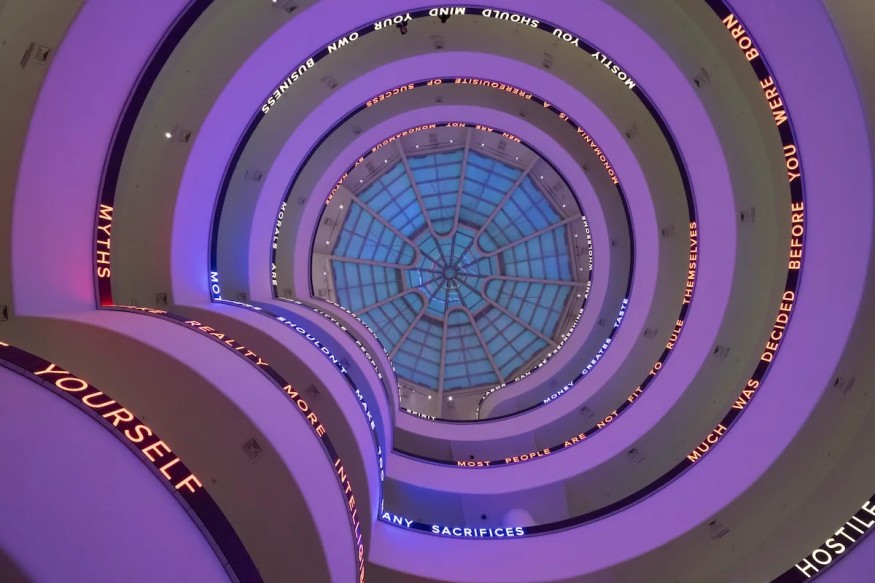Jenny Holzer’s Latest Guggenheim Exhibit Critiqued for Falling Short of Present Relevance

The Guggenheim Museum's rotunda is now adorned with scrolling text, spanning a staggering 900-foot-long LED screen. "OUR TIMES ARE INTOLERABLE," it declares- a message first penned by artist Jenny Holzer nearly four decades ago. Holzer has resurrected these words, suggesting that little has changed since. Her latest exhibition, Installation for the Solomon R. Guggenheim Museum (1989/2024), revisits her iconic work from 1989, now incorporating AI technology to create new digital effects. However, despite technological updates, the sentiments conveyed by Holzer's maxims feel more dated than ever.
A Return to Familiar Ground
When Holzer first exhibited her dictums via a screen on the Guggenheim's spiraling ramp in 1989, critics lauded her for pioneering new modes of communication within museum walls. Now, thirty-five years later, Holzer reprises the project with updated technology. However, while her words have evolved visually, the core messages remain largely unchanged. Many of Holzer's axioms offer bizarre advice or insidious directives, exuding ennui and painting a bleak picture of humanity's plight.
A Cold Reception to a Once-Great Artist
Holzer's calm and detached artistry once celebrated for its beauty and provocation, now feels inappropriately glib against contemporary discourse. While her work was once a stark commentary on the abuse of power and the complexities of language, it now feels out of touch in an era where such themes are ubiquitous on social media platforms. Her museum-filling exhibition at the Guggenheim is a testament to her failure to evolve her art for the modern era.
Also Read : Hack-Hit Christie's Achieves $114.7 Million in Contemporary Art Sales Despite Cyber Chaos
A Missed Opportunity for Critique
Despite Holzer's attempts to engage with contemporary political discourse, her exhibition falls short of meaningful critique. Films illustrating the Trump policies, for example, cursed (2022) and Stake in the Heart (2024), seem more like [ones] that miss out on context and do not provide new basics of the [tricky or forever messy] political landscape. Beyond the missing wall texts, the exhibition I refer to also downplays the viewer's need to engage critically with such thoroughly curated artwork.
A Troubling Equivalency
Holzer's attempt to equate disparate conflicts through her artwork further muddles her message. She oversimplifies complex geopolitical issues by juxtaposing quotations from various sources without proper context. Given the gravity of the subjects at hand, this approach feels particularly insensitive.
A Call for Greater Scrutiny
In an era where language holds immense power, Holzer's cavalier treatment of political proclamations feels out of touch. Her insistence on treating severe subjects irreverently undermines the gravity of the issues. Holzer emphasizes that in today's world, where everything is politicized, the only way to make a meaningful contribution to society is through the careful use of language and political engagement.
Though full of excessive messages, Jenny Holzer's exhibition at the Guggenheim Museum does not resonate with the present-day context, society, or the art audience. As society grapples with complex issues, Holzer's detached approach feels disconnected from the moment's seriousness. In an era where words have the power to shape public discourse, Holzer's art demands greater scrutiny and introspection.
From Digital Models to 3D-Printed Homes: Jaspreet Kaur Lall Explains How the Innovation Changes the Construction Industry

Future Belongs to Green Construction: Sampath Kumar Paspunoori Explains One of the Key Trends in the Construction Industry

Kamala Harris' Campaign Ad Uses Iconic Visuals from Carrie Mae Weems to Connect with Voters

Historic Ancient Roman Ruins in Baalbek Remain Strong After Israeli Air Strikes; Locals Seek Cultural Protection

4 Ways to Honor Departed Loved Ones in Your Home Design











